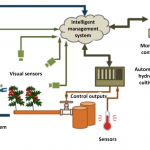SOUP - Utilizing Robotic Systems and Computational Intelligence Technologies to Reduce Costs and Inputs in Hydroponic Cultures
| 3 of 5 | << First | < Previous | Next > | Last >> | Back to gallery |
Greenhouse cultivations represent one of the most significant production sectors of Greece, with an estimated annual turnover of 900m Euros. Despite their economic importance, greenhouse cultivations are still a labour-intensive activity, with workforce and pest-management expenses making up a large percentage of the production costs. Additional problems associated with greenhouse cultivations relate to personnel health and safety issues, as well as increased environmental footprint, both arising from the use of chemical pesticides and fertilizers, and the need for product quality assurance.
In this context, project SOUP aims to modernize Greek greenhouse cultivations, by reducing their dependence on manual labour and agrochemicals, through the following technologies:
1. Automated monitoring systems that analyze the plants’ growth through the use of sensor networks, advanced image processing and state-of-the-art deep learning techniques.
2. Robotic mechanisms to automate labor-intensive tasks such as pest management and harvesting.
The combined use of the above technologies can potentially allow the individualized management of the plants, as opposed to the current practice of indiscriminate plantation-wide interventions, which leads to resource wastage and often excessive use of agrochemicals. In addition, robotics can reduce the need for human presence and manual interventions, and allow for round-the-clock operation of the greenhouse.
Hydroponic tomato production, representing one of the country’s main exported greenhouse products, has been selected as the pilot cultivation to develop these technologies within SOUP. Initially, a series of independent hydroponic chambers will be set up, containing tomato plants of different growth stages, and with the ability to inflict insect pest infestations. This facility will be the main testing ground in the development of a plant monitoring system, based on a sensor network and advanced algorithms employing neural networks and deep learning techniques, which will allow identification of pest inflictions and assessment of fruit ripeness. In parallel, a series of robotic mechanisms will be developed, which will be capable of carrying out tasks such as targeted pesticide application and automated harvesting of ripe fruits. These two core technologies will subsequently be combined with conventional automation systems, to form an innovative and eco-efficient greenhouse unit, operating under an intelligent management system. Data from this pilot unit, collected over a period of one year, will be analyzed to asses the economic and environmental impact of the proposed cultivation method, in comparison to the current paradigm, and to draw up a comprehensive results’ commercialization plan.
The SOUP consortium is formed by Glafcos Marine Ltd, a company with considerable experience in managing funded research projects, the Laboratory of Agricultural Production ,Florist Section, T.E.I. of Crete with extensive know-how regarding greenhouse and hydroponic cultivations, the Signal Processing & Communications Laboratory of the University of Patras with expertise in image processing and machine learning, the Control Systems & Robotics Laboratory of the T.E.I. of Crete with significant experience in developing robotic systems for primary agricultural production, and Up2Metric Ltd, a company specializing in applications of 3d imaging data acquisition and modelling. The combined expertise of the consortium, along with the blending of academic and commercial partners, are important elements for the success of the project.
This work is partially supported by the Greek Secretariat for Research and Technology, and the EU, Project SOUP - Utilizing Robotic Systems and Computational Intelligence Technologies to Reduce Costs and Inputs in Hydroponic Cultures, T1EΔK-04171, within the framework of “Competitiveness, Entrepreneurship and Innovation” (EPAnEK) Operational Programme 2014-2020.
Dimitrios Kosmopoulos: Leader of the UPATRAS team.

